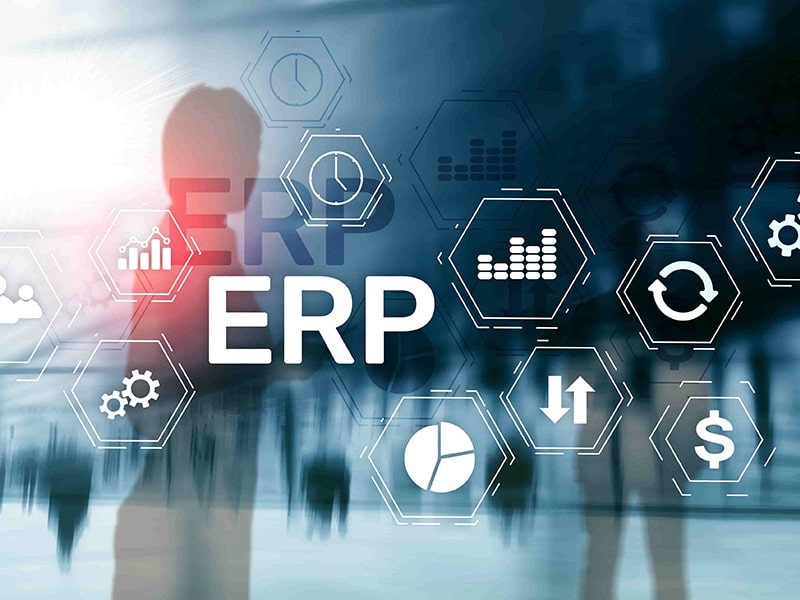Enterprise resource planning (ERP) refers to a type of software that organizations use to manage day-to-day business activities such as accounting, procurement, project management, risk management and compliance, and supply chain operations. A complete ERP suite also includes enterprise performance management, software that helps plan, budget, predict, and report on an organization’s financial results.
 ERP systems tie together a multitude of business processes and enable the flow of data between them. By collecting an organization’s shared transactional data from multiple sources, ERP systems eliminate data duplication and provide data integrity with a single source of truth.
Today, ERP systems are critical for managing thousands of businesses of all sizes and in all industries. To these companies, ERP is as indispensable as the electricity that keeps the lights on.
ERP systems tie together a multitude of business processes and enable the flow of data between them. By collecting an organization’s shared transactional data from multiple sources, ERP systems eliminate data duplication and provide data integrity with a single source of truth.
Today, ERP systems are critical for managing thousands of businesses of all sizes and in all industries. To these companies, ERP is as indispensable as the electricity that keeps the lights on.
 It’s impossible to ignore the impact of ERP in today’s business world. As enterprise data and processes are corralled into ERP systems, businesses can align separate departments and improve workflows, resulting in significant bottom-line savings. Examples of specific business benefits include:
Improved business insight from real-time information generated by reports
Lower operational costs through streamlined business processes and best practices
Enhanced collaboration from users sharing data in contracts, requisitions, and purchase orders
Improved efficiency through a common user experience across many business functions and well-defined business processes
Consistent infrastructure from the back office to the front office, with all business activities having the same look and feel
Higher user-adoption rates from a common user experience and design
Reduced risk through improved data integrity and financial controls
Lower management and operational costs through uniform and integrated systems
It’s impossible to ignore the impact of ERP in today’s business world. As enterprise data and processes are corralled into ERP systems, businesses can align separate departments and improve workflows, resulting in significant bottom-line savings. Examples of specific business benefits include:
Improved business insight from real-time information generated by reports
Lower operational costs through streamlined business processes and best practices
Enhanced collaboration from users sharing data in contracts, requisitions, and purchase orders
Improved efficiency through a common user experience across many business functions and well-defined business processes
Consistent infrastructure from the back office to the front office, with all business activities having the same look and feel
Higher user-adoption rates from a common user experience and design
Reduced risk through improved data integrity and financial controls
Lower management and operational costs through uniform and integrated systems
 ERP systems tie together a multitude of business processes and enable the flow of data between them. By collecting an organization’s shared transactional data from multiple sources, ERP systems eliminate data duplication and provide data integrity with a single source of truth.
Today, ERP systems are critical for managing thousands of businesses of all sizes and in all industries. To these companies, ERP is as indispensable as the electricity that keeps the lights on.
ERP systems tie together a multitude of business processes and enable the flow of data between them. By collecting an organization’s shared transactional data from multiple sources, ERP systems eliminate data duplication and provide data integrity with a single source of truth.
Today, ERP systems are critical for managing thousands of businesses of all sizes and in all industries. To these companies, ERP is as indispensable as the electricity that keeps the lights on.
The business value of ERP
 It’s impossible to ignore the impact of ERP in today’s business world. As enterprise data and processes are corralled into ERP systems, businesses can align separate departments and improve workflows, resulting in significant bottom-line savings. Examples of specific business benefits include:
Improved business insight from real-time information generated by reports
Lower operational costs through streamlined business processes and best practices
Enhanced collaboration from users sharing data in contracts, requisitions, and purchase orders
Improved efficiency through a common user experience across many business functions and well-defined business processes
Consistent infrastructure from the back office to the front office, with all business activities having the same look and feel
Higher user-adoption rates from a common user experience and design
Reduced risk through improved data integrity and financial controls
Lower management and operational costs through uniform and integrated systems
It’s impossible to ignore the impact of ERP in today’s business world. As enterprise data and processes are corralled into ERP systems, businesses can align separate departments and improve workflows, resulting in significant bottom-line savings. Examples of specific business benefits include:
Improved business insight from real-time information generated by reports
Lower operational costs through streamlined business processes and best practices
Enhanced collaboration from users sharing data in contracts, requisitions, and purchase orders
Improved efficiency through a common user experience across many business functions and well-defined business processes
Consistent infrastructure from the back office to the front office, with all business activities having the same look and feel
Higher user-adoption rates from a common user experience and design
Reduced risk through improved data integrity and financial controls
Lower management and operational costs through uniform and integrated systems 


